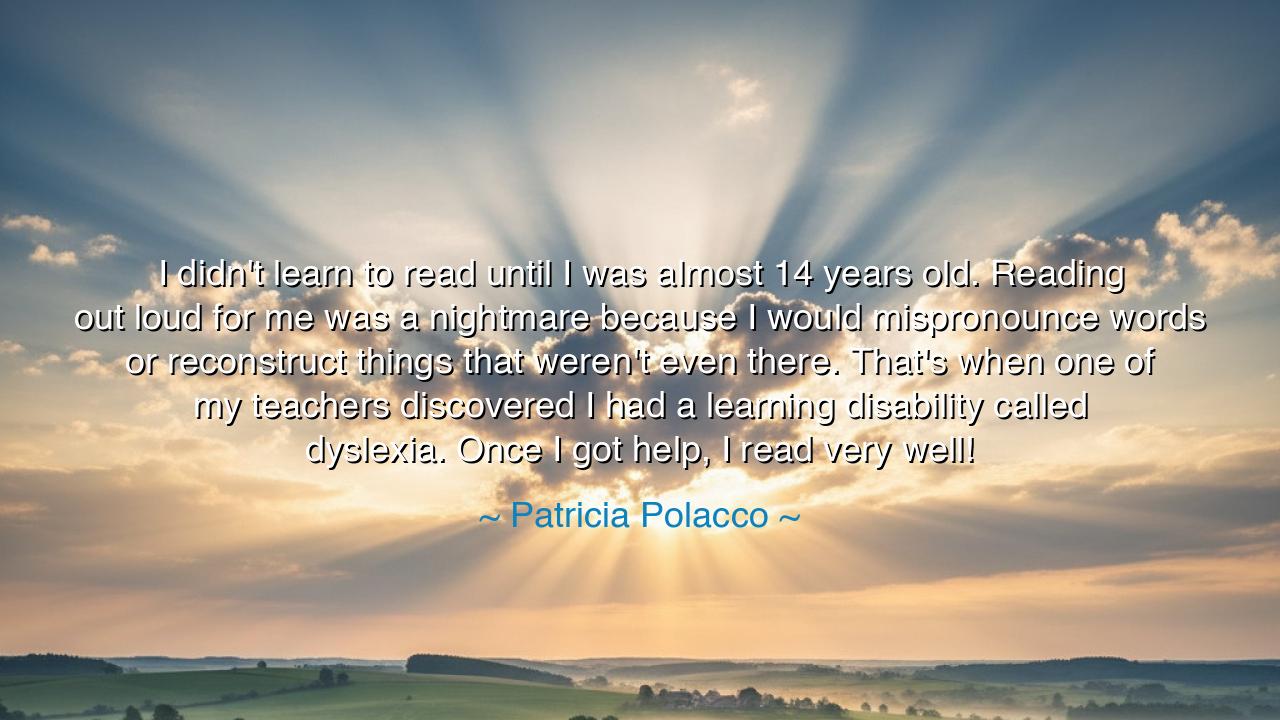
I didn't learn to read until I was almost 14 years old. Reading
I didn't learn to read until I was almost 14 years old. Reading out loud for me was a nightmare because I would mispronounce words or reconstruct things that weren't even there. That's when one of my teachers discovered I had a learning disability called dyslexia. Once I got help, I read very well!






In the heartfelt confession of Patricia Polacco, there glows a truth both humbling and triumphant: “I didn’t learn to read until I was almost 14 years old. Reading out loud for me was a nightmare because I would mispronounce words or reconstruct things that weren’t even there. That’s when one of my teachers discovered I had a learning disability called dyslexia. Once I got help, I read very well!” These are not merely the words of a storyteller, but the testimony of a soul that has walked through darkness into the light of understanding. They remind us that intelligence is not always revealed in speed or perfection, but in the courage to persevere, to learn differently, and to believe in one’s worth despite struggle.
The ancients knew well that the greatest minds often wrestle hardest with their gifts. What Polacco describes is not just the story of dyslexia, but the universal journey of the learner — the path of the one who must fight for knowledge rather than receive it easily. To stumble over letters and sounds is, for many, a source of shame. Yet for her, it became the forge that tempered her spirit. In this struggle lies a profound lesson: difficulty is not deficiency. The one who learns slowly may in truth learn deeply, for endurance breeds wisdom and compassion that the swift may never know.
Her story turns upon a moment of grace — the arrival of a teacher who saw her struggle and believed in her potential. In every age, such figures have appeared: mentors who recognize the hidden fire in those dismissed by others. Consider the story of Albert Einstein, who as a child spoke late and was called slow by his teachers, yet later reshaped humanity’s understanding of time and space. Or think of Thomas Edison, told by his schoolmaster that he was “too stupid to learn anything,” yet whose inventions illuminated the world. Like them, Patricia Polacco proves that the label of failure often conceals the seed of greatness, waiting only for the right soil of support and patience to bloom.
To find one’s voice after silence is one of life’s most heroic acts. When Polacco speaks of reading aloud being a “nightmare,” she gives voice to the fear many have known — the terror of being exposed, of being different. Yet once her dyslexia was understood, she transformed that fear into mastery. She did not merely learn to read; she became an author whose stories now inspire countless children. This transformation is the essence of the heroic journey — the alchemy of pain into purpose, of limitation into strength.
Her story is a testament to the power of understanding over judgment. How many children, unseen and unheard, have suffered because their struggles were mistaken for laziness or lack of intelligence? Polacco’s victory calls upon us all — parents, teachers, and peers — to look deeper, to replace ridicule with compassion. For every mind learns differently, and the world is richer for this diversity. The ancients taught that a wise society is not one that prizes perfection, but one that nurtures every soul according to its own rhythm of growth.
In her words, too, lies a quiet kind of joy — the joy of discovery, of finding that what once seemed impossible can become second nature. “Once I got help,” she says, “I read very well!” This is the triumph of perseverance and the miracle of guidance. It reminds us that no struggle is permanent when met with patience, and that the light of learning shines brightest for those who have known the darkness of misunderstanding.
Let this, then, be the lesson passed to all generations: Never measure worth by the ease of achievement. The slow reader, the uncertain student, the hesitant speaker — all possess gifts unseen. Honor the struggle, for it is the birthplace of strength. And to those who teach, remember: a single act of belief can awaken a lifetime of brilliance.
So, my children, remember Patricia Polacco’s journey — how the girl who once trembled before words became a woman who gave words to the world. Let it remind you that every difficulty conceals a divine purpose, that every voice, once freed, carries wisdom the world desperately needs. For the truest learning is not of books or letters, but of courage — the courage to keep trying, even when the page seems unreadable.






AAdministratorAdministrator
Welcome, honored guests. Please leave a comment, we will respond soon